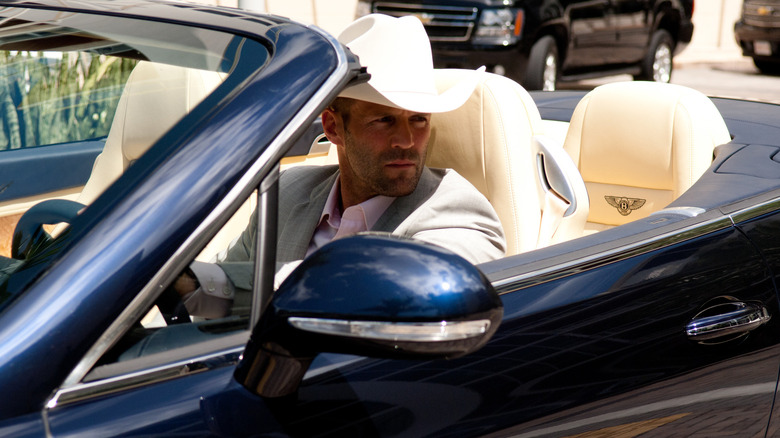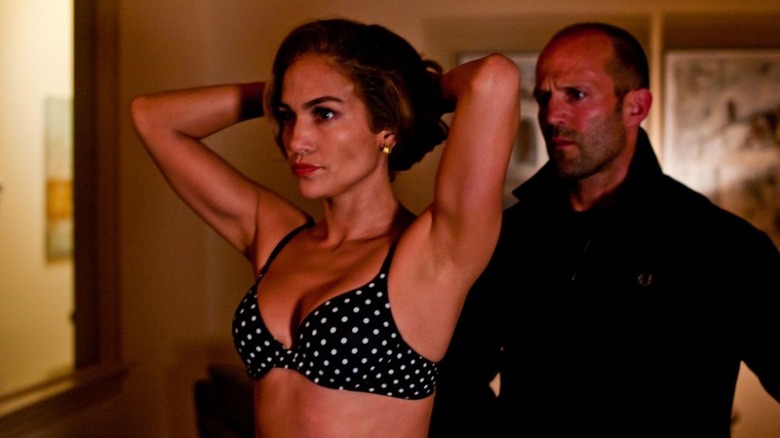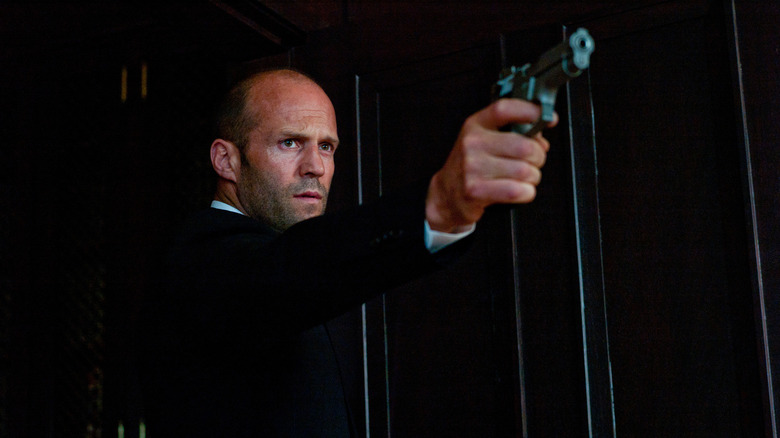Why A Rotten Jason Statham Crime Thriller Was A Bigger Deal Than You Realized
There is very little that is remarkable about Taylor Hackford's 2013 actioner "Parker" starring Jason Statham. The title character is, like so many action movie protagonists before him, defined largely by his taciturn and steely demeanor and doesn't have a lot of whimsy or personality beyond that. Parker is a thief, but he is defined by an unshakable code of ethics and believes in sticking to well laid-out plans. He's not a hothead or impulsive. In other words: he's kind of boring. It also doesn't help that "Parker" has a predictable plot stretched out across a dull screenplay. The film came and went without fanfare, a January release to its very core.
"Parker" made $46.9 million at the box office on a $35 million budget, which is a bomb on a Hollywood ledger. It was only lukewarmly received by critics, sporting a 41% approval rating on Rotten Tomatoes (based on 105 reviews). Peter Sobczynski's review for RogerEbert.com was harsh but accurate, arguing that "Parker" is "a film that seems to have been manufactured solely to play in mostly empty auditoriums for a bleak midwinter week or two before evaporating from the marketplace and the mind."
While there have been good Jason Statham movies in the past, "Parker" was not merely mediocre; it was also something of a missed opportunity. The film, you see, was based on the 2000 novel "Flashfire" by Donald E. Westlake as part of the long-running Parker book series. The first Parker novel, "The Hunter," was published in 1962 and spawned many sequels ("Flashfire" being the 19th book). It had previously been adapted to film before as "Point Blank" in 1967 (starring Lee Marvin) and then again in 1999 as "Payback" (starring Mel Gibson). However, thanks to a stipulation by Westlake, Parker's name was changed to "Walker" in "Point Blank" and to "Porter" in "Payback."
"Parker," then, was the first time a Westlake novel adaptation had been allowed to legally use Parker's name. It ultimately took 51 years to happen.
Parker was the first Westlake adaptation legally allowed to use the Parker name
As Hackford explained to the Palm Beach Daily News in 2013, Westlake didn't like the idea of a film studio adapting "The Hunter" unless it also agreed to adapt all of his other "Parker" novels. The author seemingly wanted Parker to become the star of a long-running movie franchise a la James Bond. It wouldn't be until after Westlake's death in 2008 that his widow, Abby Westlake, would feel comfortable licensing the Parker name for a feature film or TV series. Up until then, Westlake happily licensed his books while refusing to let filmmakers keep his master thief's name. The character's steely resolve and profession could stay in place, but the name was right out. So, because no one wanted to commit to a whole string of Parker movies, all the adaptations of Parker novels used aliases.
In addition to John Boorman's "Point Blank" and Brian Helgeland's "Payback" (easily the two best-known Parker movies), there have been numerous other re-christened Parker adaptations. Jean-Luc Godard's 1966 film "Made in U.S.A.," for instance, was a loose adaptation of the 1965 Parker book "The Jugger." Because film-school staple Godard never got permission to adapt Westlake's work, the author sued the project, and "Made in U.S.A." didn't get a U.S. distributor until the 2000s. The same year as "Point Blank," French director Alain Cavalier similarly made "Pillaged," itself adapted from the 1963 Parker novel "The Score." In that film, Michel Constantin played a very Parker-like character named Georges.
Then there was Gordon Flemyng's 1968 heist caper "The Split," which was based on Westlake's 1966 novel "The Seventh" and starred Jim Brown in the Parker role. (His name was changed to McClain.) Likewise, in 1973, director John Flynn helmed (and Walter Hill co-wrote) "The Outfit," an adaptation of the 1963 novel of the same name. Robert Duvall played the Parker role there, only this time, his name was changed to Earl Macklin.
Parker won't be the last movie to feature the Parker name
In that same vein, director Terry Bradford adapted the 1971 Parker novel "Slayground" into the 1983 film of the same name, with Peter Coyote playing the Parker role this time (now re-named Stone). It's worth remembering, though, that Parker's actual character hasn't changed from movie to movie. He has always remained steely, taciturn, and determined in every single screen outing; it's only the name that seems to be the sticking point. Finally, as mentioned earlier, Gibson played "Porter" in "Payback," the last Parker adaptation to come out in Westlake's lifetime.
By 2013, re-negotiations could finally commence, and "Parker" could be, at long last, used openly. Despite the extended wait, however, the final film result was a forgettable disappointment. It wasn't a large enough success to warrant any sequels, which meant the expansive Parker movie franchise never manifested (nor did Statham's Parker become the next James Bond).
In 2022, it was announced that writer-director Shane Black would be re-adapting "The Hunter" for the third time. The film, titled "Play Dirty," was originally conceived as a collaboration between Black and his "Kiss Kiss Bang Bang" star Robert Downey Jr. Black, however, later had to shift stars (likely for scheduling reasons), with Mark Wahlberg replacing Downey. "Play Dirty," which has full access to the Parker name now, is also set to star LaKeith Stanfield, Keegan-Michael Key, Rosa Salazar, Dermot Mulroney, and Tony Shalhoub.
Assuming "Play Dirty" sees the light of day, it will only be the second Westlake adaptation to feature a character named Parker.


